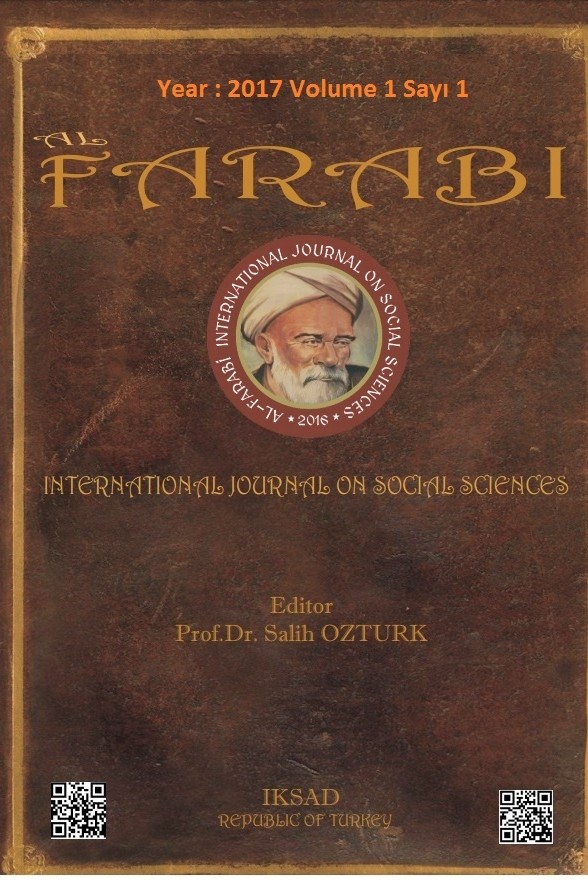MÜZİKOLOJİ BÖLÜMLERİNDE BESTELEME TEKNİKLERİ EĞİTİMİNİN YERİ VE ÖNEMİ HAKKINDA DÜŞÜNCELER
MÜZİKOLOJİ BÖLÜMLERİNDE BESTELEME TEKNİKLERİ EĞİTİMİNİN YERİ VE ÖNEMİ HAKKINDA DÜŞÜNCELER ÖZET Uluslararası sanat müziğine has bestecilik geleneğine bağlı olan ülkelerde besteleme teknikleri eğitiminin Müzikoloji bölümleri müfredatlarında önemli yere sahip olduğunu görmek mümkündür. Bu anlamda eski Sovyetler Birliği ülkeleri ve Fransa örneklerini inceleyen bu çalışma besteleme teknikleri eğitiminde adı geçen ülkelerin belli başlı standartlar yakaladıkları hususunu ortaya koymaktadır. Eğitim-öğretim sürecinde besteleme kavramının yerini belirlerken dünya pratiğini göz ardı etmeksizin bu konuda Türkiye’de etkin ve anlamlı bir örnek oluşturmak adına çalışmada bazı problemlere değinilmiştir. Bu problemlerin başında, ülkemizdeki Müzikoloji bölümleri müfredatlarının çoğunda müzik teorisine yönelik derslerin yeterli sayıda açılmaması gelmektedir. Özellikle Türkiye’nin Doğu illerindeki yükseköğretim kurumlarının Müzikoloji bölümlerinde mesleki açıdan önemli olan müzik teorisi derslerinin açılmaması, söz konusu alanda yeterli bireylerin yetiştirilmesi için bir engel teşkil etmektedir. Problemlerden bir diğeri ise Güzel Sanatlar Fakülteleri kapsamında Müzik Bilimleri bölümleri faal iken, artık Konservatuarlarda da açılan Müzikoloji bölümleri besteleme teknikleri konusunda herhangi bir yenilik veya farklılık getirmemektedir. Oysa ki, Avrupa üniversitelerinin müzikolojiye odaklı bölümlerinin müfredatlarında öğrenciye besteleme ve aranjman kabiliyetini kazandıran derslerin sayısı ve konuları takdire şayandır. Türkiye’deki müzik eğitimi sisteminden kaynaklanan mevcut durum incelendiği vakit söz konusu olan besteleme tekniklerine odaklı derslerin tam anlamı ile yürütülebilmesi için gereken koşulların oluşmadığı ortaya çıkmaktadır. Çalışmada Türkiye’deki Müzikoloji bölümlerinin müfredatlarında besteleme tekniklerinin öğrenimine yönelik derslerin yaygınlaştırılması ve zorunlu hale getirilmesi ile beraber bu derslerin dünya standartlarına uygun işlenmesi adına bazı önerilerde bulunulmuştur. Araştırmada betimsel (Survey) türün tarama modeli kullanılmıştır. Konu ile ilgili yurt dışındaki ve Türkiye’deki öğretim süreçlerini karşılaştırmak amacı ile çok sayıda internet kaynaklarından faydalanılmıştır. Araştırılmış örneklerin ve kazanılmış öğretim deneyiminin analizi sonucunda besteleme teknikleri alanı ile ilgili ciddi eksikliklerin olduğu tespit edilmiştir. Fakat bu eksiklikleri göz önünde bulundurarak, mevcut şartların iyileştirilmesi ve besteleme teknikleri dersinin tek başlık altında Müzik Bilimleri veya Müzikoloji bölümlerinin müfredatlarına konulmasının mümkün olabileceği kanaatine varılmıştır. Anahtar kelimeler: Besteleme Teknikleri, Doğaçlama, Çok Sesli Eser, Müfredat, Müzikoloji. OPINIONS UPON THE PLACE AND IMPORTANCE OF COMPOSING TECHNIQUES IN MUSICOLOGY DEPARTMENTS ABSTRACT It is possible to see that composing techniques have important places in the curriculum of Musicology departments in the countries which are clinging to the tradition of composing that is special to international classical music. Within this context, this article, by examining the examples of former Soviet Union countries and France, puts forward the fact that these countries set some major standards in terms of training for composing techniques. In setting the position of the composing concept in the process of education-training, without ignoring the practice all over the world, some problems are touched upon in order to give an efficient and meaningful example in Turkey in this matter. It is the primary problem that there are not enough courses opened on the theory of music in most of the curriculums for Musicology departments in our country. Especially in the universities of the cities at the Eastern part of Turkey, not opening the music theory courses, which are important in terms of profession, in Musicology departments poses an obstacle for training individuals who are proficient in the mentioned field. Another problem is that although the Musicology Departments are active in Faculties of Fine Arts, the Musicology departments opened in Conservatories cannot bring any innovation or difference with regard to composing techniques. However, the number and the subjects that the departments, which focus on Musicology at European universities, have to make the students gain the ability for composing and arrangement are worthy of respect. When the current situation resulting from the musical education/training process in Turkey is examined, it is obviously seen that the requirements to completely perform the aforesaid courses for composing techniques are not met. In this study, there has been made some suggestions to popularize these courses on learning the composing techniques, to make them compulsory and to perform these courses in conformity with global standards. In the research, descriptive survey method was used. A number of internet resources were used to be able to compare the education/training processes in Turkey and other countries. As a result of the analysis of examined examples and gained teaching experience, it has been determined that there are critical deficiencies about the field of composing techniques. However, by considering these deficiencies, it has been concluded that the current conditions should be improved and that it may be possible to add the composing techniques course in the curriculum of the Musicology or Music departments under one title. Key Words: Composing techniques, Improvisation, Polyphonic work, Curriculum, Musicology.
Anahtar Kelimeler:
Besteleme Teknikleri, Doğaçlama, Çok Sesli Eser, Müfredat
___
- KAYNAKÇA
- 1. Acim, S. (2003), Bestecilik ve Eğitimi, Cumhuriyetimizin 80. Yılında Müzik Sempozyumu, İnönü Üniversitesi, 30-31 Ekim 2003, Malatya http://www.muzikegitimcileri.net/bilimsel/bildiri/B-Birol.html, (21.012018)
- 2. Baillet, J. (2002), L’Esthetique Musicale de Tristan Murail, P.Szendy (Der.) Compositeurs d’aujourd’hui: İçinde 7-27. Paris, L’Harmattan
- 3. Bilgin, S., Şaktanlı, S. C., (2010), Eğitim Müziği Besteleme Teknikleri Bakımından Örnek Bir Şarkı İncelenmesi, e-Journal of New World Sciences Academy, 2010 (5/1):http://dergipark.ulakbim.gov.tr/nwsafine/article/viewFile/5000062825/5000058992 (21.01.2018)
- 4. Kasap, B. T. (2009), Müzik Eğitiminde Teknolojik Yaklaşımlar, 38. İCANAS Uluslararası Asya ve Kuzey Afrika Çalışmaları Kongresi, 10-15 Eylül, 2009, Ankara, http://www.ayk.gov.tr/wp-content/uploads/2015/01/KASAP-Belir-Tecimer-MÜZİK-EĞİTİMİNDE-TEKNOLOJİK-YAKLAŞIMLAR.pdf (23.01.2018)
- 5. Taylor, S. A. (2003), Ligeti, Africa and Polyrhythm, The World of Music (e-journal), 2003 (45/2): www.stephenandrewtaylor.net, (14.04.2016)
- 6. Tuğcular, E. (2015), Eğitim Müziği Besteleme Dersinde İzlenen Yöntemler (Gazi Üniversitesi Örneği), Afyon Kocatepe Üniversitesi, Akademik Müzik Araştırmaları Dergisi, 2015, (1/1): http://amader.aku.edu.tr/sayi1/ocakdergi1sayi.pdf (25.01.2018)
- 1. https://lesla.univ-lyon2.fr/emplois-du-temps-613268.kjsp?RH=1405607189887&RF=1421147106255 (30.01.2018)
- 2. https://formations.univ-lille3.fr/fr/fiche/description/16arts/1119?onglet=description (30.01.2018)
- 3. http://formations.univ-grenoble-alpes.fr/fr/catalogue/licence-XA/arts-lettres-langues-ALL/licence-musicologie-program-licence-musicologie/parcours-musiques-et-musicologie-2e-et-3e-annee-subprogram-parcours-musiques-et-musicologie.html (30.01.2018)
- 4. http://voronezharts.ru/sveden/education (01.02.2018)
- 5. http://www.spbgik.ru/cathedra/Kafedra-muzykoznaniya-i-muzykalno-prikladnogo-iskusstva/int_cathedra/32-Discipliny/ (02.02.2018)
- 6. http://kazanconservatoire.ru/images/Doc2015/Ucheb_plan_specmuzykoved_30.11.2016.pdf (02.02.2018)
- 7. http://www.conservatoire.edu.ge/uploads/musikismcodneoba-2013-14-_modif.pdf (03.02.2018)
- 8. http://www.conservatoiredeparis.fr/uploads/tx_sacparisensdisc/musicologie_03.pdf (03.02.2018)
- 9. https://www.bgam.edu.by/upload/dokumenty/raspisanie-2018/Raspisanie_12.02.2018/Raspisanie_muzykoved_12.02.2018.pdf (12.02.2018)
- 10. https://www.anadolu.edu.tr/akademik/yuksekokullar/294/genel-muzikoloji-anabilim-dali/dersler (19.02.2018)
- ISSN: 2564-7946
- Yayın Aralığı: Yılda 3 Sayı
- Başlangıç: 2016
- Yayıncı: İktisadi Kalkınma ve Sosyal Araştırmalar Derneği
Sayıdaki Diğer Makaleler
MİLLİ MÜCADELEDE RUMLARIN GİZLİ CEMİYETLERİ (1918-1922)
MÜZİKOLOJİ BÖLÜMLERİNDE BESTELEME TEKNİKLERİ EĞİTİMİNİN YERİ VE ÖNEMİ HAKKINDA DÜŞÜNCELER
SATIN ALMA GÜCÜ PARİTESİ YAPISAL KIRILMALAR ALTINDA TÜRKİYE ÖRNEĞİ: 2003-2018
HURRİYET. COM.TR’DE KADIN CİNAYETİ HABERLERİNİN RETORİK HABER ÇÖZÜMLEME YÖNTEMİ AÇISINDAN İNCELENİŞİ
